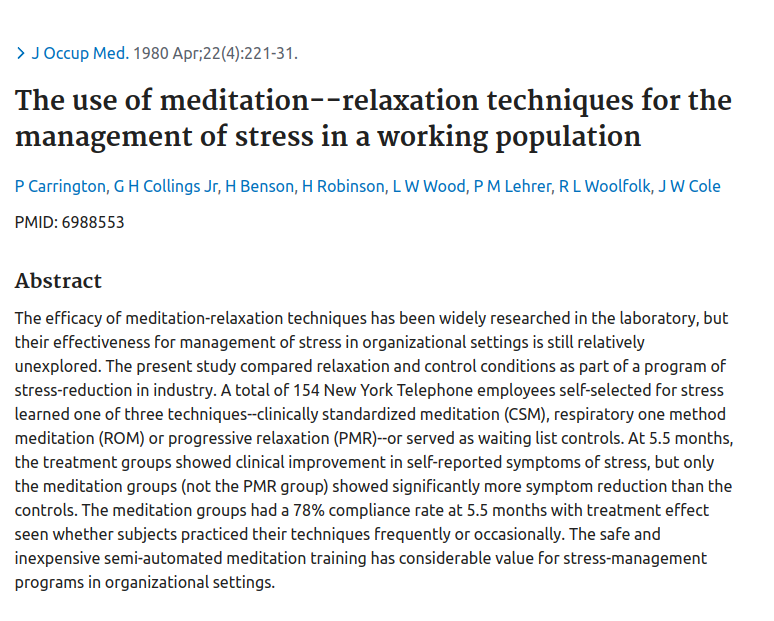The efficacy of meditation-relaxation techniques has been widely researched in the laboratory, but their effectiveness for management of stress in organizational settings is still relatively unexplored. The present study compared relaxation and control conditions as part of a program of stress-reduction in industry. A total of 154 New York Telephone employees self-selected for stress learned one of three techniques–clinically standardized meditation (CSM), respiratory one method meditation (ROM) or progressive relaxation (PMR)–or served as waiting list controls. At 5.5 months, the treatment groups showed clinical improvement in self-reported symptoms of stress, but only the meditation groups (not the PMR group) showed significantly more symptom reduction than the controls. The meditation groups had a 78% compliance rate at 5.5 months with treatment effect seen whether subjects practiced their techniques frequently or occasionally. The safe and inexpensive semi-automated meditation training has considerable value for stress-management programs in organizational settings.
The use of meditation--relaxation techniques for the management of stress in a working population
Publication
J Occup Med
22(4):221-31
Abstract
Web and Email Links
Related Listings
Journal
PLOS ONE
Mind-body practices that elicit the relaxation response (RR) have been used worldwide for millennia to prevent and treat disease. The RR is characterized by decreased oxygen consumption, increased exhaled nitric oxide, and reduced psychological distress. It is believed to be the counterpart of the stress response that exhibits a distinct pattern of physiology and transcriptional profile. We hypothesized that RR elicitation results in characteristic gene expression changes that can be […]
Journal
Frontiers in Aging Neuroscience
Numerous studies have documented the normal age-related decline of neural structure, function, and cognitive performance. Preliminary evidence suggests that meditation may reduce decline in specific cognitive domains and in brain structure. Here we extended this research by investigating the relation between age and fluid intelligence and resting state brain functional network architecture using graph theory, in middle-aged yoga and meditation practitioners, and matched controls. Flui […]
Journal
Behavioral Medicine
This study evaluated the efficacy of the relaxation response on the postoperative recovery of 27 cardiac surgery patients randomly assigned to one of two groups. Thirteen experimental group patients received educational information and practiced eliciting the relaxation response before and after surgery. The 14 patients in the control group received only information. Experimental and control groups were compared before and after surgery on both physiological and psychological recovery […]

